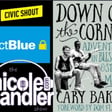Become a Creator today!Start creating today - Share your story with the world!
Start for free
00:00:00
00:00:01

FTMB #3 - Jim Callis of MLB.com
In this episode of “Follow the Moneyball” David interviews Jim Callis who heads up Draft and Prospect coverage for MLB.com – the official site of Major League Baseball.
Along with Alan Simpson, Jim pioneered Draft and Prospect coverage while serving as the Executive Editor of Baseball America before he joined MLB.com.
Transcript
Introduction to 'Follow the Money Ball'
00:00:07
Speaker
Welcome to Follow the Money Ball at the intersection of sports and money, with a healthy dose of funny and irreverence, too. Here's your host, David Sloan.
Meet Jim Callis: MLB Draft Expert
00:00:17
Speaker
I'd like to welcome my guest for today, Jim Callis, who is the lead writer on MLB.com, covering primarily the draft and minor league prospects. Correct, Jim? Yeah, that is correct. I've been doing it for... You may have been agenting before I started in my line of work, David, but that's pretty close.
00:00:35
Speaker
Um, yeah, no, I've been doing it for over 30 years. Well, I started in 1974 and I think that predated even baseball America. Yeah. Alan Simpson didn't start that till 1981. So there you go. Back then, there were not many ways to get stats even for, for guys in the minor leagues about the only thing that was available was the sporting news.
Jim's Baseball Beginnings
00:01:00
Speaker
And that was always at least a week or two behind in terms of ways to keep up with your friends. But, uh,
00:01:06
Speaker
So you grew up where now? In Northern Virginia, like so long ago that we did not have the Washington National Site. I was born in 67, so by the time I was conscious of baseball, the senators had left for Texas. So when I grew up, the Orioles were the
00:01:23
Speaker
It wasn't too bad. I mean, you could get to Baltimore and probably a little over an hour, but the Orioles were the closest team. So you grew up in the DC area and the Orioles were your team? No. Um, I was the guy, the kid who never liked any of the local teams. So I didn't refrain. Who was your team? Socks. Mike, my grandparents had a place in Cape Cod, so we'd go up there every summer. So the first baseball games I remember watching were on channel 38 when you watched them over the air.
00:01:49
Speaker
Now I'd watch Orioles, it'd be kind of grainy a little bit because Baltimore was not our local station, but I could get Orioles games on channel two in Northern Virginia and they'd be a little scratchy, but you could still make out what was going on. So you, you didn't look on radio. I mean,
00:02:05
Speaker
All the younger people listening to this are going to be like, what are they talking about? Back in the day, it was cool. You could get with just an AM radio games from, I mean, I couldn't get West Coast games, but you could pick up as far West as St. Louis and you could get all kinds of broadcasts. I could listen, depending on the weather conditions, to Red Sox games, especially if they're playing on the West Coast and it was later and it was dark, I could get West Coast games. I did listen to
00:02:35
Speaker
a lot of games on the radio as well.
00:02:54
Speaker
So you grew up like I imagine an awful lot of us did, playing the game and listening to the game and watching the game. How old were you when you first took note of the, let's call it the option, that you might want to be a writer?
From Cards to Writing: Jim's Inspiration
00:03:10
Speaker
It's funny because I remember my grandfather, I still really remember when I got into baseball. There was a friend of mine at school, had a ton of baseball cards. Back then,
00:03:22
Speaker
collecting was different too. You basically buy packs for the most part. Nobody was really buying cards from dealers. And he had a ton of extra cards and just brought like a brown grocery bag to school and just gave me a bunch of the cards. And that kind of, that was the first thing I remember stimulating my interest, that. And then like you said, I mean, we didn't have the internet. So you read the sporty news, you read baseball digest. And I remember as a young kid,
00:03:47
Speaker
There was this really cool baseball game. Before I started playing Stradimatic, I played this game called Shurko Baseball, which had the feel. Yeah. It was like, it had a feel. It was, it was somewhat basic. It was based, you know, two dice, you roll, um, the lower number you read first. There was like 21 different combinations. So they kind of sorted guys, two 50 to two 99 hitters were in one bucket, 300 to three 49.
00:04:13
Speaker
in a different bucket and had ERAs. But the coolest part of the game when I was a little kid was on this 20 by 20 grid that you unfolded, it was a baseball field. And each square was like 15 feet. And the parks were different dimensions. You had a little chart that showed you where the fences were in various parks. And you would plot where the ball would go. And sometimes a home run in Fenway Park would not be a home run in some place where it was deeper to left field.
00:04:40
Speaker
And you had players at different range grades so they could cover more ground to get to a ball. It was somewhat basic, but it was also kind of cool. I remember it impressed upon me. Guys who walked were valuable because they got on base more.
00:04:57
Speaker
The 250 hitter who walked, it's time. I mean, I know people would listen to this guy. What does he say? But that was radical back in the 70s and 80s. Like a 250 who drew walks might be more valuable than a 300 hitter. Like, people weren't thinking that way. But I remember, because anyway, I remember being up in the Cape Cod in Centerville, Massachusetts, for outside Hyannis. And I would play the games. And then, again, because I was a devotee of the sporting news, because again, you know, baseball America started, Alan Simpson started when the sporting news cut back on their baseball coverage.
00:05:27
Speaker
and all the stuff Alan love like the draft and minor leagues and recovery more. But when I was reading the sporting news like they you wouldn't just get the box scores. They have like a couple paragraph or paragraph like description like Johnny bench hit two home runs and
00:05:42
Speaker
you know, Pat Darcy threw six shutout inning, you know, like have a compare. So I would run up little paragraphs of each of my games. I remember, I don't know, I was like 10 years old this time, my grandfather. So wait a minute. So you're playing this game with friends of yours. And then you can play solitaire too. So and write ups of those games. Yeah, I was writing up. I mean, I would kind of like supporting these like long, long game stories, but like a paragraph and
00:06:09
Speaker
I still don't know why, weird things stick in your head. And I'm sure I mimicked the sporting news, but in one game I referred to like, I can't remember, was it Jose Morales? I think at one point had the record for pinch hits in the season.
00:06:23
Speaker
I want to say, which might've been 24. I don't know why I remember that. And I wrote about how pinch hitter extraordinaire Jose Morales had a Baroque kit. And my grandfather really thought that was good, like very good vocabulary for a 10 or 11 year old to use a pinch hitter extraordinaire. So that was kind of the first time I remember writing. And then what it really took off was when I went to college.
Jim's College Days: Writing and Baseball
00:06:46
Speaker
I mean, I wrote for the school paper in high school, but most people don't know what they want to do when they're teenagers.
00:06:52
Speaker
And so I went to University of Georgia with the idea that I got into business school. At the same time, my high school journalism teacher had relatives who had a newspaper somewhere near Athens. And I was going to do stuff there and kind of figure out what I wanted to do. But I never wound up working for the high school journalism teacher's relative's paper. I wound up working for the school paper and loved it. And it just so happened, the first year I covered baseball at Georgia,
00:07:22
Speaker
Was first time we ever went to the College World Series and we had two first picks on the team. And so I just loved it. And nobody else was covering it. Not even the Athens paper didn't really cover the team till they got to Omaha. The Atlanta paper didn't really cover the team. And it was a good team. They had three future big leaguers on it. And Derek Locust and Chris Carpenter were first round picks. Steve Carter got a cup of coffee.
00:07:46
Speaker
So anyway, I just loved, I mean, that, I got to go to Omaha, fell in love with College World Series. And it was kind of cool. I mean, the parent, the players were great to me because I was the only one covering them. And I was, it was funny, David. I remember I was going on the road. I was going to Georgia Southern for midweek games. I drove down to Florida State. We played Florida State in a big series on the weekend.
00:08:07
Speaker
I drove down to Tallahassee and my professors were great too. They knew I loved what I was doing because the team was really good. And most of my professors were kind of the attitude, you're taking care of business if you move class because you leave on Friday to drive to Tallahassee or you're going to miss the Wednesday class because you're going to go watch Georgia Southern. That's fine. So everybody really encouraged me. It was really cool. Have you been your non-journalism professors?
00:08:34
Speaker
Yeah, no, I like it. At that point, well, I guess, you know, I was gonna say, after my freshman year, I had a bunch of credits because I went to a high school and encouraged to take an AP test.
00:08:43
Speaker
which again, I don't think a lot of high schools did back then, they do now. So I had almost a full year of credit when I got to Georgia, but that also meant I had to make my decision quick on my major because after my first year there, I was essentially almost a junior academically. So I had switched, but yeah, even my non-journalism teachers, I mean, I had grades and I did my work, but they were all the attitude like, yeah, just for Simon's end, like you're doing well in the class. But yeah, it was great. I mean, it was really encouraging.
00:09:13
Speaker
All the non-journalism professors were encouraging. We had an independent school paper, so we weren't part of the school. It was independent. We had an ad staff that sold ads. But we were like the only school newspaper there was. But when the team went to Omaha, the athletic department and the newspaper split the cost of having me go to Omaha, which was pretty cool. I guess because I had covered the team all year and the school paper wanted to send me, but I think they want to foot the whole bill.
00:09:40
Speaker
And I traveled with the team, and that was pretty cool too, like thinking about all these years. They didn't have to do that. And then at that point I was stoked. So I was stoked. So you were 19, 20 years old at the time? Yeah. And it was funny. So again, I'll date myself again. Back then there was no internet. So find out where we had to get ranked.
00:10:01
Speaker
where we were ranked in the rankings and baseball America had the best rank. You had to call baseball America and they would read you the top 25, one through 25 every week, which was kind of a funny way to do it. So we would do that. And so they had a year long internship, but they were social and it was going to be a bunch of filing and office work. And I was like, I'm not going to put my degree on hold for a year to do that.
00:10:22
Speaker
But I started talking to John Scheer, who was the managing editor of the magazine at the time. And when I called him about the internship, we got to talking. I found out, OK, I'm not going to be interested in it. But I was like, I got this little bull. I was like, how do you pick who writes some of your features when you do features on players, on college players? Because they had written features on Lilquist and Carpenter using a writer from the Athens paper than a writer from the Atlanta paper. I was like, those guys don't even come to the team. Like, they weren't at any of the games.
00:10:52
Speaker
And we just got to talking, and next spring they had me write a feature on how Georgia was rebuilding its pitching staff. And then they had an internship that was a summer internship. The first thing I did, they were doing a big book on history of the draft. And the first project I undertook was I literally input the name, position, school, and then asterisk if you didn't sign for every player who had been drafted from 1988 at that point.
00:11:20
Speaker
which was a data entry. It was, it was, but I did it. I did it well enough and quick enough that had enough time to do writing. And at that point, like I knew I wanted to work for baseball merit. I mean, at the time, again, I mean, this is 30, almost 35 years ago, nobody else covering prospects. Nobody was a draft. I started reading the magazine in high school because I just thought it was really cool the depth they went into, which nobody else was doing. At that point, they were your source for minor league stats.
00:11:48
Speaker
Yes, they were two weeks old by the time you got them. But that was your only choice. Like, no, no, no, I'm trying to answer one quarter left. They hired me to come back after I finished my degree. And the winter meetings were in Atlanta. So I literally turned in my last pay. I had a class where you could turn in a paper, take a file, and I drove from Athens to Atlanta for winter meetings, and it didn't work ever since. So not only were, correct me if you disagree, not only were they not covering
00:12:18
Speaker
the draft that much or covering even more importantly prospects.
Prospects and Draft Process Evolution
00:12:22
Speaker
but teams were not really valuing prospects back then. They do now or have the last several years since the Moneyball book came out. Yeah, I would agree. I think they care about prospects, but not like they do today. I don't think that if you have young players who are good, they're cost-controlled. I mean, they knew they were cost-controlled, but the way salaries have continued to grow and grow. Now, if you have a really young player,
00:12:50
Speaker
You know, Mike Trout as a rookie was probably in terms of what he did on the field where it's like, I don't know, $70 million production to the Angels and he was making less than $500,000. And I don't think teams necessarily were aware of that. I don't think they were that, you know, when I started 30 years ago, that how much, you might have a vague idea of the concept, but exactly how much they were saving.
00:13:15
Speaker
And his salaries have continued up and up and up. I mean, I still remember when the guy making a million dollar annual salary was like, oh, the horrors. What's what's going on? Oh, it's the end of the world. Yeah. It was going to be the ruination of the game. Yeah. And then blown way past that. And I think it even more puts an emphasis on if you have on player a productive
00:13:36
Speaker
Like that's worth even more than you're getting more value out of that guy than you are is whoever the, you know, if, if Garrett Cole goes out and after a year, you're still paying Garrett Cole $5 million. And that if you have a young pitcher who's really, really good and he's making the minimum, like it's the equivalent of the NFL contract, it just makes it a lot easier to put players around him. So I don't think teams were looking at it all like that. And you mentioned the draft too, David. I mean, I started,
00:14:06
Speaker
Again, it's funny now that we have the draft is being broadcast on two networks and MLB has moved it to the star game to put a greater spotlight on it. When I started, it was top secret. And you probably remember this, David. They would release the first.
00:14:22
Speaker
And after that, you would get a draft list like maybe a few days later, but it didn't differentiate between round, between the guy who was taking the second round and back then you could draft forever. And the guy who was drafting the eighth round, they had this notion that college coaches were using the draft list to recruit and they didn't have the college coaches to know what rounds players were taking in, which is crazy. But that's kind of how they looked at the draft back then.
00:14:45
Speaker
Well, I'd like to think that I played somewhat of a part in that too, because the logic, if you will, was also that agents were using the draft to recruit. And that was 100% true. I mean, my first full year of being an agent was 1975. And I acquired a client who was taken to the first round of the draft that year by the name of Sam Wellborn.
00:15:09
Speaker
Well, I had never heard of Sam Wellborn before the draft, but I saw but I saw that he was taken in the first round by the Phillies and immediately saw where he was from. And I've just figured, OK, how many Wellborns are there in Wichita Falls, Texas? And I got out the phone and just started calling people. And eventually I reached the right Wellborn and talked to his dad. And from there on, eventually wound up
00:15:39
Speaker
acquiring him as a client. And there I was at the age of 23, sitting in a room at the Astrodome Hotel across from Dallas Green, who had been in baseball for about 100 years at that point. And again, I'm 23 years old and I'm negotiating a contract for Sam Wellborn. The other big thing at that point in regard to the draft and particularly agents was
00:16:07
Speaker
So many players were afraid to get an agent because they were afraid that if they had an agent that the team would look differently at them and yeah, they would because they knew they were gonna have to give you more money if you had a reason. I remember I mean I was I was not covering them and talking out Simpson the year that Mike Moore went wrong.
00:16:28
Speaker
It was because he didn't have an agent. I think Ron, that was your Ron Darling was, you know, at Yale, but he had an agent. So Darling slipped. That was a hundred percent true. I mean, you know, cause you were agenting back then. Again, the bonuses were much smaller and teams, not only did they not want you to have an agent, if you even tried to negotiate, well, you don't really want to play pro ball. Like if you want to play pro ball, you'll just take what we'll give you and
00:16:57
Speaker
You know, when they started the draft, the year before, in 1964, the year the draft came in 65, Rick Reichert was a two sports star, football guy, baseball guy at Wisconsin. He got a bonus, a little over $200,000.
MLB Draft History and Player Negotiations
00:17:10
Speaker
And then that came and Rick Monday, roughly half of that is the number one pick in 1965. Anybody even match Rick Reichert's bonus on the open market till
00:17:21
Speaker
the mid to late 80s, like bonuses just didn't get shows you the power to the open market. And the story I always like to tell again, I wasn't covering it, but just talking to people who worked in baseball. So Barry Bonds, you know, you can love or hate Barry Bonds, but obviously on the field on the greatest players of all time, was a second round pick out of high school in 1982. Drafted by the Giants, a team for which his father starred
00:17:45
Speaker
He's Willie Mays God's son. You think the Giants are going to get this done? I mean, these days you don't not sign your second round pick. And I've heard, I've heard two versions of, he wanted $66,000 where they offered him 70,000 and he wanted $75,000. And the Giants were like, no, you can just go to Arizona State over like five or $6,000. And he wound up being a first round pick and then one of the greatest players in baseball history.
00:18:11
Speaker
I mean, that's how it was back then. If you weren't grateful that this team was going to pay you to play professional baseball, a lot of times, I mean, you go back and look at all these guys who were great college players in the 80s, like Barry Larkin and Will Clark and Randy Johnson and Rafael Palmeiro. All these guys, most of those guys were relatively high picks out of high school who didn't just jump at the offer they got and they wound up going to college.
00:18:36
Speaker
and became really good players and got drafted high and then were in the big leagues almost immediately. And I think that's kind of when it started to turn when teams realized, you know, we're kind of looking at this wrong. If we're identifying the right players in high school, but we're not paying enough to sign them, maybe we should pay them. And then things kind of changed. But it was just a totally different era back then.
00:18:56
Speaker
Well, I'll tell you one of my great draft stories. So in 1976, I represented a player by the name of Herman Segelke. He was from South San Francisco and the Cubs drafted him with the seventh pick in the first round. And they offered him $30,000 to sign.
00:19:12
Speaker
And they told me the rationale for that was their number one pick the year before, who I had tried to recruit on successfully, a kid by the name of Brian Rozanski, was the number four pick. And they had signed him for $40,000, the number four pick in the first round. So they basically said their $30,000 offer was take it or leave it. And I said, fine, we'll leave it. Now Herman was not a great student.
00:19:40
Speaker
And as a result of that, his options as far as college baseball were limited. But the Cubs really hadn't done their homework in that regard. And I had become acquainted with Justin Dato, Rod Dato's son, a coach at University of Southern California.
00:20:00
Speaker
And my roommate, Gary Atwell at Arizona State had played on the first all-star team that went over to Japan. And that was how he got to know Justin because Justin was part of the coaching staff along with his dad. So at any rate, I got in touch with Justin and I said, hey, Justin, look, I've got something that would benefit both of us if you're willing to work with me. Said, what is it? So I got this kid who's drafted in the seventh round that I'm representing. The Cubs have drawn a hard line. It'd really be great if I could release a story
00:20:30
Speaker
to the Chicago newspapers that he was going to sign a letter of intent to attend USC. And Justin said, well, I don't have any problem with that, but it'd be good if I had a scholarship for him just in case he did show up. What are the chances of him going to school? And I said, Justin, the only way he could get into USC would be with burglar tools.
00:20:51
Speaker
And Justin allowed me to release that story. And literally 24 hours later, the Cubs offer went from 30,000 to 50,000. They threw in some college money, which we both knew Herman was never going to use. And the incentive bonus and Herman signed and went off to rookie camp. So that that was just the way things were back then. But again, the number seven pick signing for 50 grand, 50 grand. It was a completely different world back then.
00:21:20
Speaker
So let me go back a little bit to an earlier point in our discussion. So nine or 10 years old, you were writing these sporting news type blurbs. That's amazing to me. And the reason that it's so amazing to me is you probably don't appreciate it. But for most people, one of the most difficult skills is learning how to write. I mean, I can remember
00:21:46
Speaker
I can remember my freshman year at Arizona State, there was a guy who I became friends with who was on the baseball team, a kid by the name of Kent Jacobson. And Jake played pro ball, wasn't drafted high, and I think he got to double A or triple A with the Brewers. But at any rate, we're in a political science class where there was two, 300 kids in an auditorium taking notes. He didn't know how to take notes.
00:22:11
Speaker
He didn't know how to write a coherent term paper. And this was a kid who was a freshman in college, so 18 at least years old, 17, 18 years old. And here you were at 10 writing things that your grandfather looked at and said, that's great in comparison to the way things were in the sporting news. So you were undoubtedly a writing prodigy. And boy, talk about- I was lucky, my mom, my mom,
00:22:40
Speaker
I mean, she got into real estate later, but when I was young, she was just staying at home taking care of me. And she actually taught me to read when I was two. So I read a ton. I mean, I think the two ways you become better at writing are, one, by reading and seeing how other people write, and two, by writing a lot, the more you do it. Like a lot of things, the more you do it, the better you get. And I was fortunate that I had
00:23:07
Speaker
My mom taught me how to read when I was really young. Tell me off and take me to my mom, my grandmother, to the local Krispy Kreme. And I'd be reading the donut flavors. And the people behind my grandmother would always tell the woman behind the counter, be like, yeah, they would, oh, yes, he is. And they'd have me read some more. But they encourage, I learned how to read when I was young. And I always, you know, anytime I want more books, off to the library.
00:23:47
Speaker
No question about that, and that had to play a huge role in it.
00:23:56
Speaker
You had to also be pretty damn good, so I think that there was some natural ability there, just like a kid at 10 years old being a prodigy as a pitcher. You were obviously a prodigy as a writer. I probably would have trained it if I'd been given the option, but it didn't work out that way. I understand, as probably would have, all of us.
00:24:18
Speaker
You know, it's certainly something everyone enjoyed playing the game and would have loved to have been able to play it better. Even great players, I know, guys that I represented who played in the majors, it was like, well, you know, if I would have been able to do this a little bit better, I'd have been a better player. And, you know, pitchers always wanted to hit
00:24:42
Speaker
Um, that sort of stuff. So, you know, I, I had guys that, uh, were pitchers is like, Oh man, they wanted me to swing the bat. I'm telling you, I'm a good hitter. I'm a good hitter. Yeah, sure. Sure you are. No question about it. No question about it. So, um,
00:24:58
Speaker
In regard to that comparison, playing and writing about playing, you know there's a great quote from Jim Boughton that says, you spend a good piece of your life gripping a baseball and in the end it turns out that it was the other way around all the time.
00:25:14
Speaker
Would you say that a similar situation exists in terms of writing? For example, if you weren't writing for MLB, would you be writing books, let's say, or for a different publication? I don't know, because I've kind of done the same thing pretty much my whole career.
00:25:40
Speaker
Well, I mean, I guess probably, because I've done it for so long. But I don't know if I hadn't started working for Baseball America, I don't know what my path would have been, because there weren't a lot of different options back then in journalism. But I pretty much have been doing what I've been doing. I mean, the only thing at the time, I did something a little bit different. When we moved from North Carolina, where Baseball America is still based, my wife and I moved to Illinois, where she grew up, and she's involved in the family business.
00:26:09
Speaker
1997, and we had two young kids, and we had four. And then it was so long ago, you couldn't really work remotely very easily. So I worked at Stats Inc. for a couple of years. And back then, it was like they did a number of books. I was in the publications department, so there was writing involved there to the same extent. And then Baseball America got sold, technology changed. They asked if I want to come back and work from home, which was great, with three, and then soon four young kids at that point.
00:26:38
Speaker
But yeah, I don't know. I mean, I obviously enjoy writing. So yeah, I mean, I probably would have found some similar career, I guess. I mean, the funny thing is, like, it could have turned out differently, because when we moved up here, and again, I mean, this was, the internet was just starting, which seems strange to say. So there weren't, you know, a lot of, you know, it wasn't like there's all these places outlets on the internet.
00:27:04
Speaker
But I interviewed, I came up here, there were three, when we knew we wanted to move up here, but I need some kind of job up here, I interviewed at three places up here. There was Stats Inc., which is still going strong, and it's still in the Chicago area, although they kind of altered the way they did things. They got bought out by Fox Sports about three years later, right after, or right before I moved, or switched back to the A. I interviewed with Inside Sports. They were based in downtown Evanston,
00:27:32
Speaker
where Baseball Digest was also based. It was the same publishing company, although they eventually went under. So it was good that I didn't necessarily get that route. And then I was really interested in working for Pro Football Weekly, which was based in suburban Chicago. That was kind of the football version of Baseball America. And I interviewed there and interview went well. But Stats Inc. offered me a job first.
00:27:59
Speaker
And I took it. So like, if Stats Inc. could drag their heels, I might have gone to work for Pro Football Weekly in 1997. And they're no longer in business. I mean, I obviously would have gone on something else, but like, I might have been at Pro Football Weekly for 10 or 15 years. Yeah.
00:28:16
Speaker
In terms of writing though, do you feel that there's an important part of you that is expressed in your writing? Because your writing is different from Jason Stark's writing or Ken Rosenthal's writing or Bob Nightingale's writing. And that being said, do you feel that that is even a small facet of who you are that need to express yourself in the innate Jim Callis way?
00:28:45
Speaker
maybe a little less so than you might think, just because a lot of my writing has evolved now. I'm writing up draft reports or player reports for minor leaguers, which isn't exactly creative. I do try to put some work in and give you some background on the player, and I do try to dig deeper. But I get what you're saying too, because I don't get to do as many features because I'm doing so much reporting and ranking of players.
00:29:12
Speaker
But I just wrote a feature on Scott Roland and how Philly scouted him when he was, again, this was way back when, 1993, he's in southern Indiana, which is not a baseball hotbed, how he lasted 46 picks and he was a two sport guy. And like, I didn't do that because you got to show off your writing chops a little bit and tell a story. And that was fun. And I guess, thinking about just talking to you here, David,
00:29:37
Speaker
I guess it's not even so much the writing. It's like I put a lot of time and effort into ranking players. And I know that there's not necessarily a right or wrong answer. We may not know that answer for five or 10 years down the line because a lot of these guys are pretty young and they're high school players if we're talking about draft guys. But I still take a great deal of pride in having good information and making sound decisions and how I rank them if that makes sense.
00:30:05
Speaker
draft where I'm projecti where again, I'm not bei being as stylistic as s trying to hit you with a
00:30:18
Speaker
I deal with pride in having the best information and making more phone calls. Yeah, I mean, I guess it's funny. I hadn't really thought about it, but I guess I do. I guess that it's necessarily, you know, like, again, I'm like, I'm writing memorable prose, but I hope I'm giving you a lot of, like, when I'm writing down reports from my past.
00:30:48
Speaker
Well, I'm not just saying this to blow smoke up your ass. I think the thing that's always stood out for me in your writing is your perspective. You have not just taken a straight, okay, I heard from three scouts regarding this guy and their opinion is this, this and this and I've seen the guy myself and I've baked that into the cake and now here's what I'm putting out. Your perspective is completely different than that.
00:31:01
Speaker
even in those cases where creative per se, I still a
00:31:16
Speaker
Your perspective is one that I think encompasses a deeper dive, let's call it, than most of the other people that cover the same ground that you do. And I think that's one of the things that makes you a great writer. That's just my perspective and take it for that, which really isn't worth much. But nonetheless, that's one of the things that for me has always stood out about you in addition to just who you are as a human being, which is a great person, a great guy.
00:31:46
Speaker
I'm pivoting in a different direction here. You covered college baseball a long time, and I'm sure you've also taken note of developments in other areas of college sports.
The Impact of NIL on College Baseball
00:32:00
Speaker
I'm wondering, do you think that there will come a day in the not too distant future
00:32:06
Speaker
where some of the name image and likeness money is going to go into college baseball because there's always been an occasional prospect who is ranked highly and for whatever reason does not sign with the team and generally that's been in the past because his price wasn't met
00:32:29
Speaker
or he was drafted by a team that that approached him poorly or whatever the case may be and the kid winds up as you know first or second round talent going to college baseball. Now I'm wondering if it's going to change where you get a kid who may be let's say a marginal first round draft choice and he's approached by a college coach and tells him okay look they're offering you decent money but we can provide you with a
00:32:59
Speaker
quarter of a million dollars in NIL funds for the three years that you'll play here before you're drafted again. And when you come out as a junior, you'll be drafted much higher. Do you think that will happen? And if so, when do you think that that will start having an effect on the way that the draft is occurring anymore? Yeah, I mean,
00:33:21
Speaker
I don't know. Like first round pick, you're talking 3 million. Let's even say second round pick. Like if it's a high school kid, it might be $2 million. I just don't know how many schools have that kind of NIL money. Like it's fine. I'd love to know what like everybody thinks LSU and they may. LSU probably does have the best NIL program out there for baseball right now.
00:33:43
Speaker
But nobody really knows what, you know, Dylan Cruz was getting or Paul Skeens is getting. And I have rumors of seven figure deals for players, but I've also heard, ah, it's more like a hundred thousand dollars a year for 10 years. I don't, so we don't know. Like it's all just random speculation. LSU continues to do great in recruiting, but there's also a lot of reasons you want to play at LSU. It's a great program. It's great fan base.
00:34:08
Speaker
great coaches. They just title. So it's, it's hard to it makes more of a diffe who might be on the fence
00:34:22
Speaker
he's waffling, where then it's like, yeah, you know as you said, you're exac a lot easier to get paye yourself in three years of for certain profiles of p who don't take off till th position players who are g really necessarily good
00:34:43
Speaker
and teams tend to be, okay, let's see if you hit in college before we pay you big money. I think those guys who are on the bubble, but I don't know if we're gonna ever get in a situation, or I should say ever, but I don't know if we're close yet to where you're gonna have a guy who's like a $3 million player, a $2 million player, where the NIL money's big enough to lure him to college if he does exactly.
00:35:10
Speaker
I just, as much as I love college baseball, I don't know that it's big enough, enough places to where you're going to have that kind of N.I. element. Do you? I mean, how close do you think we are on that? I think we're fairly close. And here's my rationale, Jim. First of all, you mentioned LSU. They've got a gymnast there, a female gymnast who's making over a million dollars.
00:35:34
Speaker
And I don't think they're drawing nearly the numbers for gymnastics that they're drawing for baseball. Another reason that I believe that's the case is that when I started at Arizona State, they had a reasonably small on-campus baseball facility. And then they moved into Packard Stadium, where the seating capacity was probably a couple of thousand. Well, now,
00:36:03
Speaker
You can hardly go to a school in any one of the D1 conferences that does not have a baseball facility that seats at least a couple of thousand. And there are several, correct me if I'm wrong, that have seating capacities in excess of five thousand.
00:36:21
Speaker
And they've got broadcast deals with various streaming services and things like that. So there's a lot more money generated in baseball in college than there used to be.
00:36:34
Speaker
in addition to which they're identifying these promising prospects much, much earlier. Back when I was in high school and playing ball, the kids that I played with that got college scholarships for the most part, they were not identified until the coaches saw how they performed in their senior year of school.
00:36:56
Speaker
Now, they're identifying promising players as a freshman in high school, if not sooner because of the various showcases that are taking place, and they're following these kids all along.
00:37:08
Speaker
And they want to get those kids because they've spent money just following those kids in time. And they're going to want to get some return on their investment. And in order to do that, they've got to recruit the best talent. And again, I don't think it's going to be where you're going to see a kid who's in a position assigned for three or four million dollars. And any school, whether it's LSU, USC, Georgia, Florida State, Miami, any of the big baseball schools,
00:37:38
Speaker
You're not going to see them come to the kid and say, well, look, you'll get four million if you sign will match that. But what they're going to do is they're going to say, we'll give you a lot of money. And in addition to that money, you're going to get the opportunity to be a college kid, which, as you and I both know, is the best job you'll ever have.
00:37:57
Speaker
and get an education, build your name in that community so that even if you don't make it in the big leagues, you could come back to Athens, for example, and get some sort of job through the alumni network. And you're set for life, essentially, as opposed to if you sign and you don't make it in the big leagues and you don't take advantage of the money that you're given for college,
00:38:23
Speaker
your shit out of luck to be quite frank about it. The only thing I just don't know, I think LSU is unique. They've been so baseball crazy for so long. I went to Georgia, and I don't think that many fans of Georgia care about college baseball to where they're going to have that much NIL money.
00:38:46
Speaker
for play. You brought up Olivia Dunn. She's interesting, but she also has a huge Instagram presence, which I think is, even like Bobby Wood Jr. was one of the more famous high school kids in recent memory.
00:38:59
Speaker
But it's not like Bobby Wood Jr. had it again. I mean, this thing's exploded over the last four or five years, too. Well, I guess we're going to be good. Max Clark, who is the number three pick by the Tigers this year and Graham, he got seven point seven million dollars was going to sign. But he did have a social media following. So maybe if you like, I think you need more than just baseball talent, at least initially to get. And I know I'm speaking from a place of ignorance here, too. I just don't know how much NIL money there is in baseball.
00:39:27
Speaker
I believe LSU has a decent amount, but I don't know how much my alma mater Georgia has for baseball. Football, yeah, I'm sure we have some NIL money devoted to football. Basketball and baseball, I don't think we have that much going to Georgia athletes.
00:39:42
Speaker
Well, I think that what's happening is the schools are forming, they call them collectives, where they're raising money with the collective and the collective can allocate the funds where they want it to go. And I think that you're right, baseball doesn't garner the attention in college that football does and in some schools as basketball does. But when they have a good team, when they have a team that's contending for
00:40:08
Speaker
at least a regional tournament, then there's a lot more interest. And where the interest flows, the money follows soon behind it. Another factor I think that is coming to bear is that a lot of these kids that, as I said earlier, are being identified much sooner, much younger, and fortunately, or in my opinion, unfortunately, are getting hooked up with agents much earlier. And the agents are helping them create social media following.
00:40:37
Speaker
And that all comes to bear in terms of, OK, you know, here's here's what it's going to take. University of Georgia, if you want to recruit my guy to come to your school, sort of thing. So I think it's a changing landscape. I don't think it is changing.
00:40:53
Speaker
as significantly or nearly as rapidly as it's changing in football, which is changing most quickly of all, or basketball, which basketball, there's a completely different paradigm because you're essentially looking at one and done kids.
00:41:09
Speaker
as opposed to baseball, you're looking at kids that are going to come and play for three years.
Baseball Showcases: Jim's Perspective
00:41:14
Speaker
So I've mentioned showcases a couple of times. What's your opinion on those? Do you think that they are a benefit to the game or do you think it's a detriment? Because I have my opinions, but no one's interested in them nearly as much as they are in yours. Well, I think there's benefits and detriment to showcases. And again, this is
00:41:36
Speaker
I guess a sign that you're old is how much different things are. Like when I started, maybe the area co-games was gone and then I think team one had a showcase or two, but there weren't any showcases. Now everybody, their showcases, depending on where you live, you're around. Like if the weather's good enough, there's showcases all over the place. I think early today, people, players get seen. Players don't fly under the radar as much as they used to. But I'm not just seeing the same sign pro ball. Like to me, and I'm with you, like, unless you're getting paid,
00:42:06
Speaker
you know, an amazing amou then I think a lot of guys high school would be first a college experience. I just would be very valuable to not players going in pro ball to play college baseball an get a college experience or experience is important. S
00:42:32
Speaker
The parents and players don't necessarily understand the showcases as much as they should. Like you don't have to go to every showcase. I think there's some kids who try to go to a bunch and you don't need to go to every showcase. I think unfortunately there's a showcase mentality.
00:42:50
Speaker
Where if I'm going to showcase, I'm going to train for the showcase. And that's going to be throw the ball as hard as I can, spin the ball as fast as I can, hit the ball as hard as far as I can. And I don't think that necessarily is great for the health of players in some cases. It's more like players and their parents sometimes focus on
00:43:12
Speaker
developing tools rather than skills, but the teams rewarded too. I mean, it's funny, like the teams will acknowledge, K, you know, pitching all about velocity, but who are the pitchers who get rewarded the most in the draft, especially on the high school side? It's the guys who throw the hardest or spin the ball the fastest. I think they've, they allow players to be seen much more easily than they were back in the day. And from a scouting standpoint, as players, and that didn't exist when I started, you know, you'd have,
00:43:40
Speaker
You know, Earl Cunningham jumps to my former Cubs first-round draft pick in 1989, top 10 pick, this big strapping dude from South Carolina. You mean Earl Cunningham, the guy who bought six cars within the first year after he signed his first contract?
00:43:54
Speaker
I don't know about that. I don't remember that one. But the problem was, like Earl Cunningham's playing South Carolina high school competition. And he never saw anybody resembling Crow Pitching until he got a pro ball. And what happened? He got blown away by Crow Pitching. I mean, there were a lot of guys that that happened to. Paul Coleman was, I don't know why I'm remembering, gosh, the 1980 draft.
00:44:15
Speaker
Paul Coleman was another guy, great athlete. Al Shirley was like a couple drafts later and you go on and on and on. But now you have the showcase circuit and you can see guys perform again, you know, you see the best hitters against the best pitchers and get a better sense of how it's going to play when they're facing better competition. So there's some positives, but like I also think
00:44:38
Speaker
I also think there's kids and the parents are well intentioned like, Oh, we got to get my kid a scholarship and it's hard enough to get a scholarship in baseball anyway. Um, so we're going to send the key. We're going to spend a bunch of money to send my kid to a bunch of showcases when that kid probably isn't good enough to go pro or play at a high level college. And yet the parents are spending hundreds of hundreds of dollars, send them to multiple showcases thinking it's going to make their kid a better player.
00:45:06
Speaker
And I don't think that's necessarily the case. Well, I don't know if you're a fan of the show on HBO, Real Sports with Brian Gumbel. But a couple of years ago, they had a segment where there was a family that had, I think, a couple of sons and a daughter. And the sons played baseball and the daughter ran track.
00:45:25
Speaker
And between the three kids, they paid $50,000 a year to travel and go to showcases with those kids. Even if you're fairly well off, that's still a big bite in the wallet. For me, the biggest problem that I have seen in regard to showcase or biggest problems is that they started out where it was the seniors in high school that got invited to these showcases.
00:45:53
Speaker
Then it went from seniors in high school to the next draft class. And then it just kept getting younger and younger and younger and younger. And I've seen showcases for kids as long as as young as nine. There was a guy there was there was an attorney who I was talking to a couple of years ago in regard to another enterprise I was involved in.
00:46:15
Speaker
And I told him, I said, OK, you know, we're talking on Tuesday. Can I call you Friday afternoon? Well, no, I won't be here. I've got to take my son. He's involved in a travel ball tournament. I said, oh, your son plays ball. I said, yeah, what position? Second base. I said, how old is he? He said, seven.
00:46:31
Speaker
So a seven year old was playing travel ball. Now, I wasn't even playing organized baseball at seven. And granted, you know, I'm a dinosaur. But nonetheless, you literally didn't even start back then until nine years old. So I think that that's one big problem is that it's the emphasis has gotten younger and younger and younger and younger. And when you've got adults involved, it takes the fun out of the game. And that to me is horrible because that's the most important thing.
00:47:01
Speaker
There's constant pressure to perform, too, David. There's constant pressure. I mean, I think pitchers are getting hurt because they're also throwing and twerking the ball more than ever. But if you're a pitcher and you're going to showcases throughout the year, there's no downtime. It seems like a lot of great, and again, maybe I'm getting off my lawn. I'm not talking with an old guy, but a lot of great players, when I was growing up, were starting to cover it, were multi-sport guys who played.
00:47:30
Speaker
baseball in the spring and maybe you played during the summer and football in the fall and basketball in the winter. And it kind of develops different groups of muscles. If you're a pitcher, it gave you some natural time off. And now, I mean, I think a lot of it is just the rise in colleges and college education and everybody's convinced like their sons, you know, or daughter, you know, are going to get a scholarship. So we've got to find their talent and then nurture and enhance that talent at a very young age. They can get a scholarship.
00:48:00
Speaker
And even with the cross-education going up, like the real sports example you just cited, even if you get a full scholarship, you probably spent more than that, you know, doing all these, you know, showcases and personal trainers and nutritionists and massage therapists and everything. And so on. Yeah. Even with the rising cost of college education, I mean, let kids be kids. And again, I'm not trying to come down the showcase circuit. I think a lot of it comes from parents.
00:48:28
Speaker
who are convinced this is what's best for their kid and I don't know. I mean, I do think there's some benefits, but I also think there should be some time off where you're not wearing baseball 24, 7, 365. Well, look, you mentioned Scott Roland and perfect example. He was also a very good basketball player. So, you know, there's the example of play tennis to play tennis in high school as well. So, you know,
00:48:52
Speaker
He was a good athlete and was not totally focused on baseball. You mentioned the other thing that I was going to say in terms of the problems with showcases is parents. They misinterpret the results, if you will, of a showcase. Kid goes to a showcase, blows up, and now all of a sudden a parent who's looking at a kid from the perspective of
00:49:12
Speaker
Maybe this kid would be good enough to get a scholarship to a D2 or D3 or an NAIA school. And now all of a sudden, oh, he's a number one draft choice. Why? Because he got a hit off of a kid who was touted as a potential number one draft choice. And one of the things that took the shine off of the agent business for me
00:49:33
Speaker
was the fact that it had gotten so out of whack in terms of the focus of the parents. Instead of them just being the number one fan of their kids, it devolved to where parents viewed their kids generally in one of two ways, either as a meal ticket,
00:49:49
Speaker
or as a way for the parents to jerk off their egos, where they were able to say to another kid's parents, well, my kid's gotten a scholarship from better, offer from better schools than your kid. And that to me is just a horrible perversion of just the entire purpose of having your kid play any sport, whether it's baseball or football or whatever the sport may be. And I hated to see that and even worse, I hated to deal with it.
00:50:15
Speaker
Um, to a great extent, also the kids misinterpret the, uh, the results as well, because they do, um, a good job at a showcase. And all of a sudden they're picking out the place in Cooperstown where their hall of fame plaque is going to go. And that just really, as I say, it took a lot of the shine off of the agent business for me.
00:50:35
Speaker
Well, Jim, look, I've already kept you longer than I thought I would. Is there a particular area that you'd like to cover before we conclude here? I don't want to ruin your entire Saturday. No, no. I mean, this has been fun kind of reminiscing to my kids about things that happened before the Internet existed. They just look at me and they're like, what? It's like, no, believe me. And it did. No, this has been fun kind of talking about it. The question is really interesting. Like I said, it's
00:51:03
Speaker
I don't know if we'll ever see. It seems like Congress is anxious to pass NIL legislation because we're getting the NCAA. But I'd be very curious just to see what the NIL numbers are. For baseball, you mean? You know, I've heard so many rumors. I'd be very curious. Like, that is something interesting to see. And that's one where, I mean, you're an agent. I'm a player's advocate. And it's funny, like, everyone's
00:51:29
Speaker
I'll bump into somebody who knows what I do. I'll start talking like, oh, it's crazy how much money these players make. These guys make an NIL money. Why does the coach allow? The big one now is the transfer portal, David. Like, oh, this transfer portal, this is terrible. It's like, why shouldn't the players be able to move? Like, if I'm a coach, you look at like,
00:51:49
Speaker
football,
Player Rights and NIL in College Sports
00:51:50
Speaker
you look at these huge stadiums and the coaching salaries and the huge coaching staffs and all the way it's going to all these people who don't play the game and the players get nothing and have no rights about the transfer portal and be like, well, like if I don't begrudge Brian Kelly, but Brian Kelly left Notre Dame when they were trying to get into the college football playoff to take, was it 10 million a year from LSU? Why shouldn't the players be able to make that decision?
00:52:16
Speaker
Oh, I agree 100%. And recently there was a tweet that I put out in regard to a comment from Lane Kiffin, because Lane Kiffin, I guess it was at the SEC media days in advance of their fall practices starting, was bitching about the amount of money that everybody is putting out there for NIL money these days. And, you know, how are players getting this money? And I said, you know, I tweeted, how can you say this? This is a guy
00:52:41
Speaker
who's never won anything of any consequence. And he makes $9 million a year guaranteed and no one's dislocating any of his joints. Whereas these kids suffer any brain trauma. Right. Yeah. Yeah. No, I agree. Like, like, it's always fun to be interesting that you get a certain segment of fans who complain about what players, you know, what freedoms they have. And it's like, why shouldn't the guy be able to join?
00:53:08
Speaker
I've even had people say, oh, maybe they should only be able to transfer their graduate. It's like, again, the wide open free agency, I realize that could be a little bit much. But again, you both know that in most of these colleges, the scholarship's renewable every year. So after a year, I don't want to play around scholarship anymore. I can just say, look, goodbye. Or if I'm at a school that gives you a four-year scholarship, I think the SEC may do that.
00:53:33
Speaker
I can still run you off. I'll have you run stadium steps to where you'll want to leave. Well, it's even it's even simpler than that, Jim. The coach just has to go to the guy and say, you're never going to be able to compete for a job here because players want to play. Players want to play. They'd rather go somewhere else where they have a chance to play if they know that there's no chance that they're ever going to get on the field for, you know, whatever school they're at at the time and look at your career. OK, you started off.
00:54:00
Speaker
working at Baseball America, you went to stats, you came back to Baseball America, you were a journalism major, a kid at University of Georgia who's there playing football, they're essentially a football major. Why should they not have the same right at mobility that you have as a journalism major? It's hypocritical. You know, you're like, what if when I came out of school, like I got drafted by Lacrosse America,
00:54:28
Speaker
and I don't even know where La Crosse America, I think there was a publication called La Crosse America. I don't know anything about La Crosse and maybe they're in some part of the country I don't want to live in. I have no choice. Like, I mean, I'd have to go right from La Crosse America, probably get paid lower than my market value. Maybe they'll give me a signing bonus, David. And then at some point I become a free agent and I can try to do whatever, but like, or even if it was to cover baseball, maybe I'd get, you know,
00:54:55
Speaker
Jackson, Mississippi to cover the double A team and I'm nothing against Jackson, Mississippi. But maybe I don't want to live in Jackson. Maybe I want to go live in the Northeast or whatever. Like, yeah, it amazes me that people think, oh, they're getting an education. Yeah. Yeah. Like some way schools.
00:55:12
Speaker
in football, particular basketball, they're steered away from harder courses, their time commitments. How many of those kids always are graduating actually too? Well, two things I would say. Number one, and I know this from having had roommates at Arizona State that played on the baseball team and the fact that I went out for the baseball team at Arizona State and I saw how much time that took away from my work as far as school was concerned.
00:55:39
Speaker
In effect, you're having two full-time jobs because you're an athlete and you're a student. The other thing I would say is if I would have represented you and you would have been drafted by Lacrosse America, I guarantee you would have gotten the deal you wanted. Well, good. Yeah, I hope so. I'm sure I would have, David. I would trust you to get the deal for me. It was interesting talking about how back in the day,
00:56:04
Speaker
You know, I mean, guys, the agents and you'd record, I mean, it's a different, you know, you're talking about identifying players early. Agents have to recruit players earlier too. Like if you wait until they're a high school junior or senior, it's too late. Just, I was telling the agents after this draft just finished, they're already looking at not just 20, I mean, 20, got 2024 kids are already committed. Yeah. They're looking at 2005, 2026 kids right now. 100%.
00:56:30
Speaker
And in 2026, kids are like 15 years old. But if you lock them up now, you're not going to get them. Yeah, in 15, I'm sorry. That's way too young to make a decision that is that important in terms of determining what you will do and what you will be literally for the rest of your life. Because an awful lot of people
00:56:52
Speaker
And this may or may not be true in your case. It was not in mine. But an awful lot of people, when you go to college, that's the time in your life where you make a lot of lifelong friendships and in many, many, many cases, meet the person that you're going to marry.
00:57:09
Speaker
So a kid at 15 is not capable of making that decision and many parents of a 15 year old prodigy athlete aren't really capable of making that decision because they were never in that position themselves to begin with and have no idea whatsoever of how to make those decisions. So what's happening is you're getting people whose interests
00:57:35
Speaker
don't necessarily coincide with that athlete and that parent, be it the college coach, be it an agent, be it a pro scout, who are influencing them and telling them, well, you should do this or do that or go to this school or go to the other school.
00:57:51
Speaker
So the individual player, which you're a player advocate, I was a player advocate for 44 years representing them. I'm still and always will be on the side of the players. Those interests are not being served as well as they can be. And much to the detriment of not only those individual players, but the game itself, because if the individual players aren't being served, how can the collective bunch of players be served?
00:58:19
Speaker
Yeah, interesting point. The different entities you're talking about too also have different goals in mind.
00:58:24
Speaker
Not everybody's even working towards the same purpose. Right. One hundred percent. And oftentimes in the case of college coaches, you're a shortstop, let's say, and they're coming to you and they're saying, you know, we want you to come to our school. Well, there's already a kid at that position and there's a kid backing him up and they're recruiting you out of high school and another kid out of high school and a junior college kid that play the same position. Now, you may or may not be aware of it.
00:58:49
Speaker
And you may or may not be a kid that says, well, I don't care who else you recruit, I'm going to take the job. But nonetheless, all those things factor into your opportunity to play. And as my former college roommate and player who started as a freshman at Arizona State, Gary Atwell said, players play. Players play.
Conclusion and Listener Engagement
00:59:11
Speaker
Thanks to Jim Callis of MLB.com. He's still on Twitter as Jim Callis MLB. If you're enjoying the Follow the Money Ball podcast, I hope you'll share it with others who might appreciate it. Our home base is followthemoneyball.substack.com. And there you can listen to past episodes, leave a comment or send me a message. Constructive criticism and guest suggestions are welcome. Until next time, I'm David Sloan. Thanks for listening.











